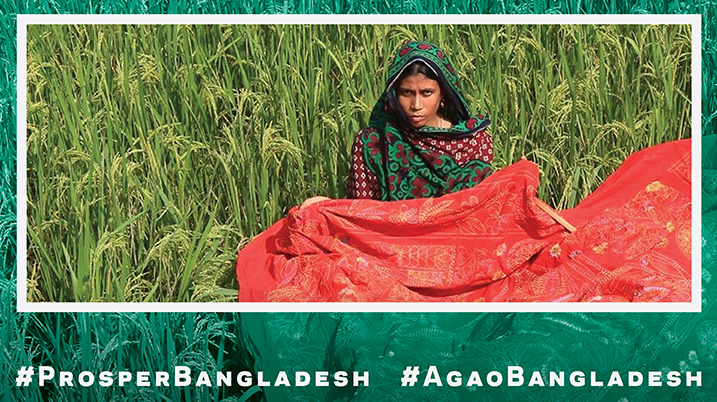President Kim announces financing to help increase commitments up to $1 billion
DHAKA, October 17, 2016—World Bank Group President Jim Yong Kim today said he hopes financial support to Bangladesh to end stunting among its children could increase up to $1 billion over the next three years as he marked End Poverty Day in the country to learn lessons from its attempts to become more prosperous and end extreme poverty by 2030.
Praising Bangladesh’s record in reducing poverty in a meeting with Finance Minister Abul Maal Abdul Muhith, Kim said the world could learn much from how Bangladesh had improved the livelihoods of tens of millions and empowered women despite facing persistent challenges, including those related to governance and climate change.
“Competing in today’s digital economy requires a workforce with well-developed intelligence, which is why the World Bank Group wants to increase its investments to end stunting in Bangladesh as soon as possible,” said Kim on the first day of his first visit to Bangladesh. “Failing to invest in a skilled and healthy workforce is ultimately harming future economic growth and that’s why we commend Bangladesh’s commitment to end childhood stunting.”
Kim joined a public event today to mark the United Nations’ International Day for the Eradication of Poverty to celebrate Bangladesh’s achievements in lifting millions of people out of poverty despite the formidable challenges it faced at the time of independence and its vulnerability to natural disasters. He announced the World Bank Group will establish a multi-donor trust fund for other countries to learn from Bangladesh’s experience.
Despite Bangladesh’s success in reducing maternal and child mortality, and improving child nutritional status, the number of stunted children are among the highest in the world. Among children under five, about 5.5 million are stunted, out of whom poorer children bear a disproportionate burden of stunted growth.
The Banks’ investments in children’s early years in Bangladesh will support nutrition services and include a conditional cash transfer program targeted to 600,000 poor families in 43 sub-districts.
“The World Bank Group wants to increase its investment in Bangladesh to improve nutrition and cognitive development of children in their early years. Ensuring adequate nutrition prenatally and in the first two years after birth can prevent devastating permanent effects on cognitive and brain development, thereby improving the long run earnings potential of children. Rapid brain and physical development, social relationships, and environments work together to create phenomenal advances in children’s capabilities during this time frame,” Kim said. “Investing in the socio-economic environments of particularly poor children during their early childhood years can help increase their earnings ability and lift their households out of poverty.”
The World Bank’s stepped up support to early childhood development announced by Kim represents almost a 100 percent increase in investment compared to the previous three–year period. The amount is contingent on a successful replenishment of the International Development Association, the World Bank’s fund for the poorest countries, which should be agreed in December.
Earlier in the day, Kim met the finance minister, planning minister, and other senior government officials, civil society representatives, and private sector leaders.
Background:
Since Bangladesh’s independence, the World Bank Group has been the country’s largest development partner in terms of volume of financing and provided more than $24 billion. Currently Bangladesh is the largest recipient of funds from the International Development Association (IDA), the World Bank Group’s fund for the poorest countries with 38 projects and a total commitment of more than $9.5 billion. Its private sector arm, IFC, has a committed portfolio of $1 billion and MIGA has $305 million in gross exposure in Bangladesh.

